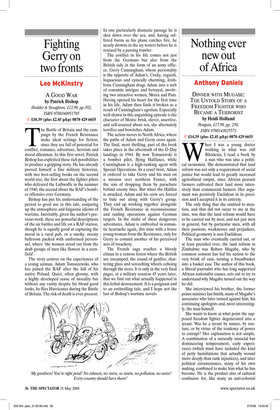Fighting Gerry on two fronts
Leo McKinstry
A GOOD WAR by Patrick Bishop Hodder & Stoughton, £12.99, pp.392, ISBN 9780340951705 ✆ £10.39 (plus £2.45 p&p) 0870 429 6655 The Battle of Britain and the campaign by the French Resistance make ideal settings for fiction, since they are full of potential for conflict, romance, adventure, heroism and moral dilemmas. In this first novel, Patrick Bishop has exploited these rich possibilities to produce a gripping story. He has already proved himself a fine military historian, with two best-selling books on the second world war, the first about the fighter pilots who defeated the Luftwaffe in the summer of 1940, the second about the RAF’s bomber offensive over Germany.
Bishop has put his understanding of the period to good use in this tale, conjuring up the atmosphere and linguistic idioms of wartime. Inevitably, given the author’s previous work, there are powerful descriptions of the air battles and life on a RAF station, though he is equally good at capturing the mood in a rural pub, or a smoky, sweaty ballroom packed with uniformed personnel, where ‘the women stood out from the drab groups of men like flowers in a cornfield’.
The story centres on the experiences of a young airman, Adam Tomaszewski, who has joined the RAF after the fall of his native Poland. Quiet, often gloomy, with a highly developed sense of morality but without any vanity despite his blond good looks, he flies Hurricanes during the Battle of Britain. The risk of death is ever-present. In one particularly dramatic passage he is shot down over the sea, and, having suffered burns as his plane catches fire, he nearly drowns in the icy waters before he is rescued by a passing trawler.
The conflict in his life comes not just from the Germans but also from the British side in the form of an army officer, Gerry Cunningham, whose personality is the opposite of Adam’s. Cocky, roguish, loquacious and cynically charming, Irishborn Cunningham drags Adam into a web of romantic intrigue and betrayal, involving two attractive women, Moira and Pam. Having opened his heart for the first time in his life, Adam then finds it broken as a result of Cunningham’s egotism. Especially well-drawn in this anguishing episode is the character of Moira: brisk, clever, assertive, and self-assured about sex, she alternately terrifies and bewitches Adam.
The action moves to North Africa, where the paths of Adam and Gerry cross again. The final, most thrilling, part of the book takes place in the aftermath of the D-Day landings in 1944. By now Tomazewski is a bomber pilot, flying Halifaxes, while Cunningham is a high-ranking agent with Special Operations. In a cruel twist, Adam is ordered to take Gerry and his men on a mission over northern France, with the aim of dropping them by parachute behind enemy lines. But when the Halifax is attacked, Adam and his crew are forced to bale out along with Gerry’s group. They end up working together alongside the French Resistance in reconnaissance and raiding operations against German targets. In the midst of these dangerous adventures, Adam is embroiled in romantic heartache again, this time with a brave young woman from the Resistance, only for Gerry to commit another of his perceived acts of treachery.
The French saga reaches a bloody climax in a remote forest where the British are encamped, the sound of gunfire, shattering glass and screeching wheels echoing through the trees. It is only in the very final pages, at a military reunion 45 years later, that we find out what actually happened in this lethal denouement. It is a poignant end to an enthralling tale, and I hope not the last of Bishop’s wartime novels.










































































 Previous page
Previous page